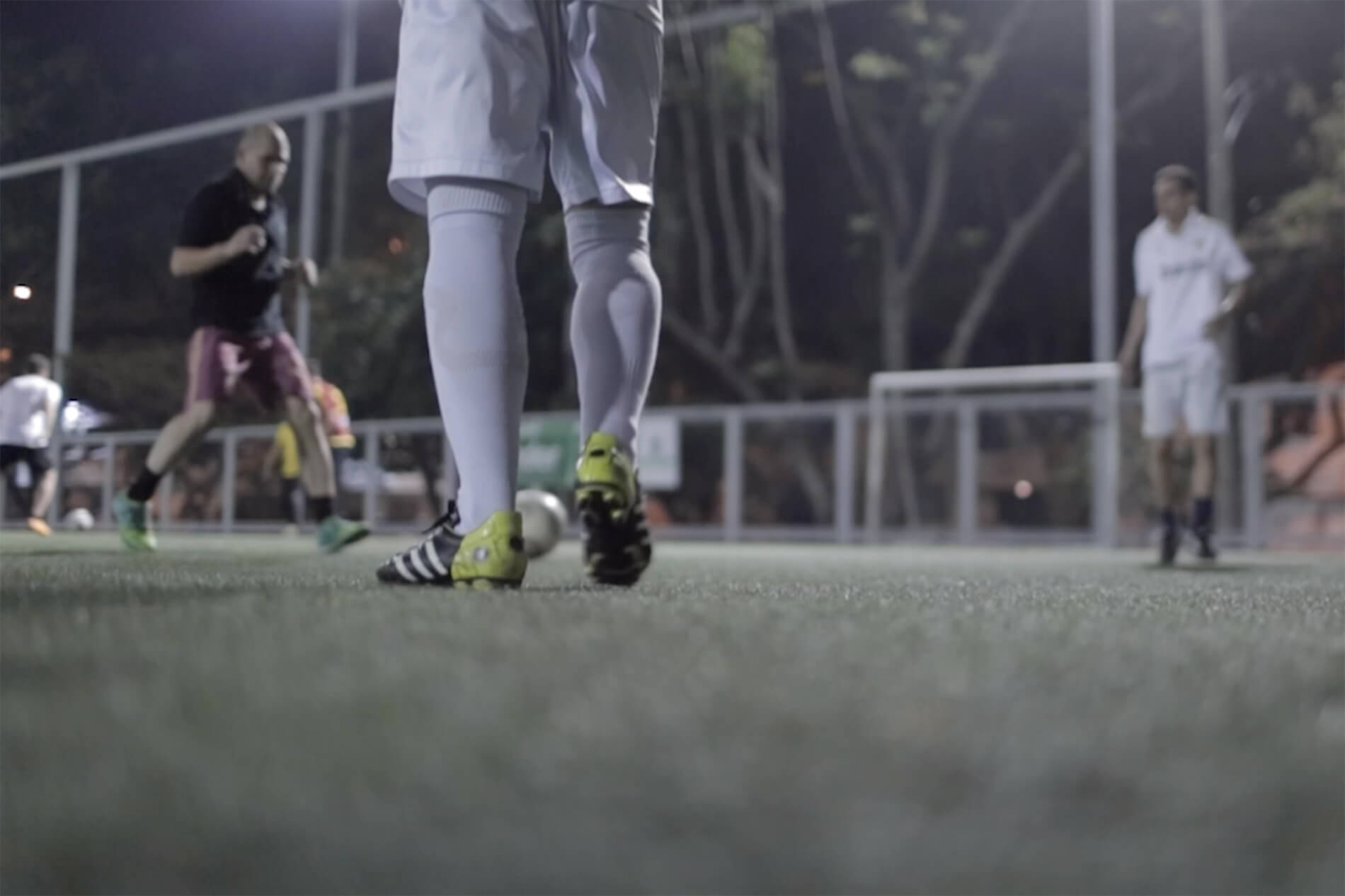“¡Hay que terminar!”
“You have to finish!” Soccer players with Adidas-striped shoulders shout from the sidelines as their teammates complete a four-on-four drill. The next wave of defenders enters the field, causing black turf beads to fly through the air. One player, wearing all white, save for his neon yellow cleats, slides toward the ball, tripping the offensive player looking for an open man.
“¡Sigue jugando!”
“Keep playing!” The ball travels like a current between the defender’s feet, as he dribbles it to safety. A whistle signals the end of the play.
The defender, Laurenti Velasquez, jogs off the field, content. When he’s playing soccer, he feels in control—of himself, of his surroundings. Nothing else matters. Not the anger he feels knowing his two children, just 3 and 5, are 900 miles away. Not the sadness thinking about the empty-shelved supermarkets in his home country. Not the millions of Venezuelans who live for weeks at a time without electricity.
But when he leaves the field, everything comes back. The 25-year-old immigrated to Colombia in 2016, but Venezuela is always on his mind. He sends about 40 percent of the salary he makes working as a storekeeper at Distripartes, an auto shop, back to his children every month –– which amounts to $380,000 Colombian pesos, or USD $119.
Distripartes offers Velasquez benefits that he’s never had at his previous odd jobs in Colombia. He’s been there for seven months and receives insurance, paid overtime and commission for his sales. Financially, he’s better off than he was in Venezuela, but the cost of living is much higher here. He didn’t have to pay rent in his home country and monthly expenses such as food and transportation were a fraction of the price of Colombia’s. These expenses force him to make sacrifices in his new country, like renting a room from one of his teammates instead of having his own apartment.
“Immigrants here can’t enjoy luxuries, like traveling, for example,” Velasquez said. “In Venezuela, you could save for moments like that. Here you could do it, but it would be too much sacrifice.”
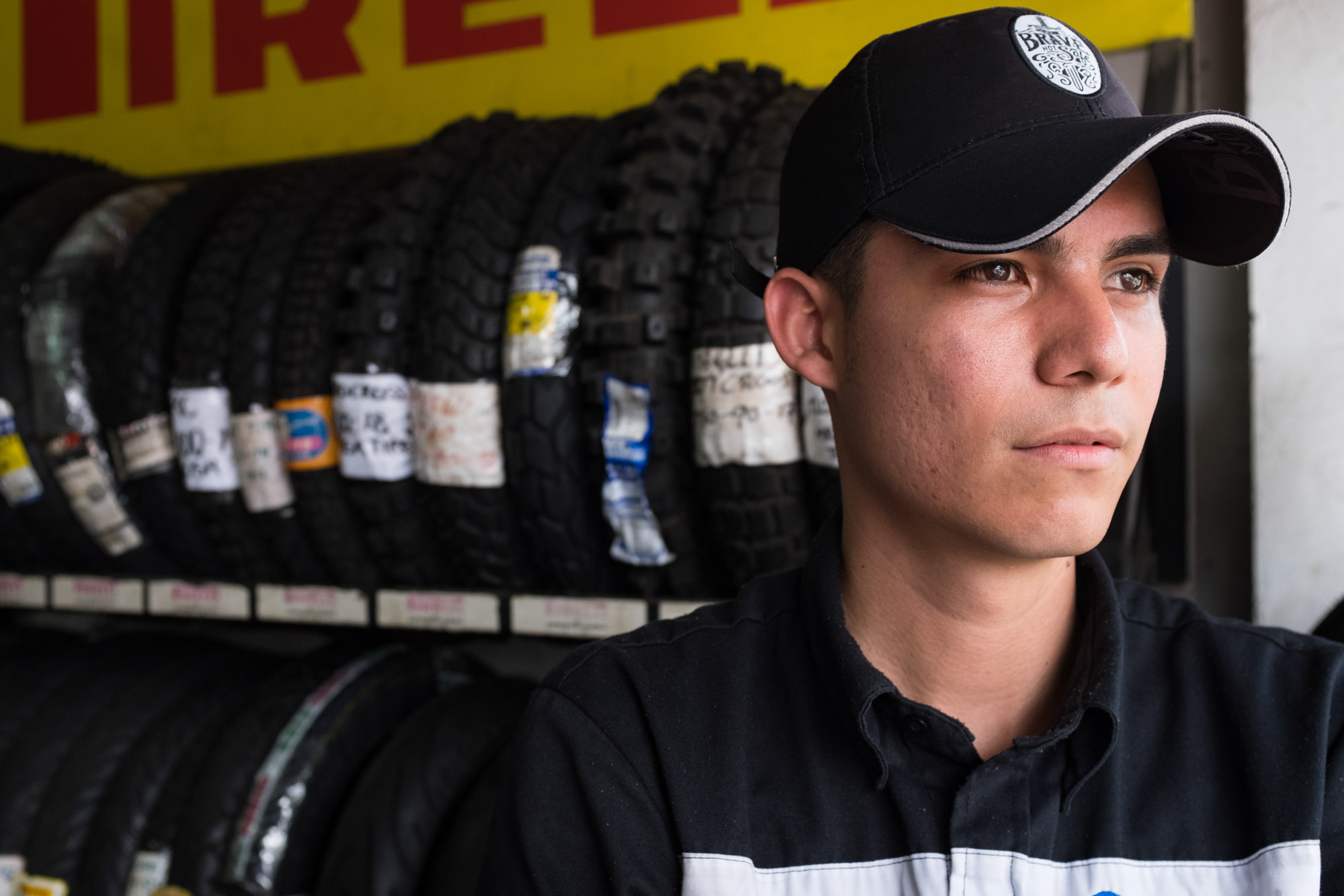
Laurenti Velasquez poses for a photo at Distripartes, the auto shop where he works.
Thousands of Venezuelans know sacrifice too well. In the last five years, inflation has risen from 57 percent to 10 million percent, partly due to crashing oil prices, the country’s main source of revenue. Since then, more than 3 million Venezuelans have fled the country—about 10 percent of the country’s total population. Over a third of them are now in Colombia. Those left behind struggle to pay for groceries, medication and other basic necessities. Most rely on remittances from loved ones. In 2018 alone, economists estimated that Venezuelans living abroad sent more than USD $1 billion to relatives unable to leave.
“We’re far from our families and far from our country, but we’re here because we’re fighting for them,” Velasquez said.
Venezuelan bolívar Timeline
The bolívar is an ever-changing currency
1879
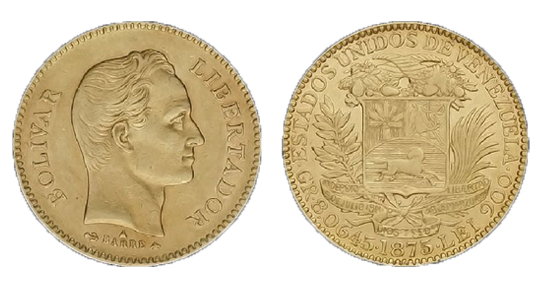 Bolívar Coins (Bs.)
Bolívar Coins (Bs.)
Bolívar
The bolívar (Bs.) was a stable currency pegged to silver, gold, and the US dollar.
Bolívar
Due to economic inflation, coins and bank notes of larger values had to be issued.
1998
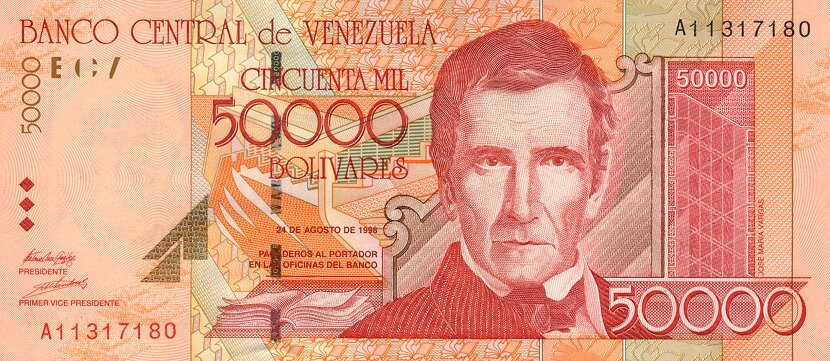 Bolívar Bank Notes (Bs.)
Bolívar Bank Notes (Bs.)
2008
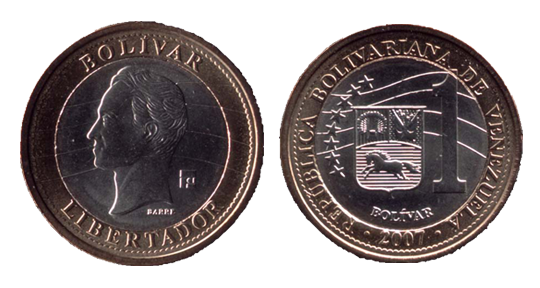 Bolívar Fuerte Coins (BsF.)
Bolívar Fuerte Coins (BsF.)
Bolívar fuerte
The bolívar fuerte (BsF.) replaced the bolívar, taking off three zeros from the currency. Inflation remained even though the numbers were smaller.
Bolívar fuerte
Economic inflation strikes again, requiring larger coins and bank notes to be issued.
2016
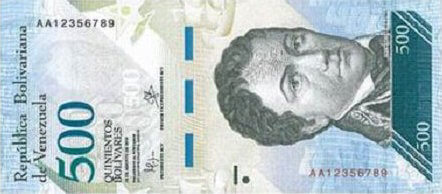 Bolívar Fuerte Bank Notes (BsF.)
Bolívar Fuerte Bank Notes (BsF.)
2018
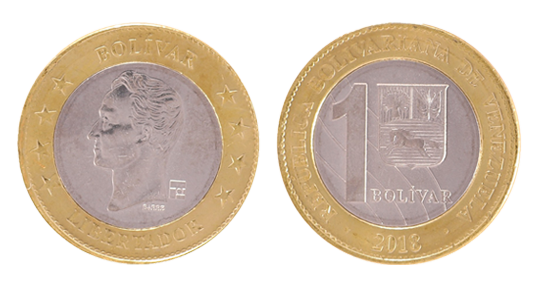 Bolívar Soberano Coins (BsS.)
Bolívar Soberano Coins (BsS.)
Bolívar soberano
The bolívar soberano (BsS.) replaced the bolívar fuerte and took five zeros off the currency.
Bolívar soberano
The bolívar soberano is the most recent reissue but due to hyperinflation the currency is virtually worthless.
2019
 Bolívar Soberano Bank Notes (BsS.)
Bolívar Soberano Bank Notes (BsS.)
* Data from DW, Republic de Venezuela, CNN and OANDA.
Velasquez stands beside the goal, shifting his weight from one cleat to the other while he waits for the next rotation in the drill. His coach strolls toward the middle of the field, unfazed by the players scrambling for the ball around him. Once he reaches the half field line, he scans the scene in front of him, watching the men for technique.
“Allí está.”
“There it is.” The coach nods, and another whistle ends the drill.
Players crunch turf beneath their feet as they gather around centerfield, panting from the workout’s intensity. The coach, Alvaro Cardenas Martínez, looks at each of the faces on his team. He’s content, but for a different reason than Velasquez’s. It’s almost 10 p.m. on a Wednesday night, and he’s at a public sports complex. Although it is late, he is worried about his players’ technique rather than if he will get home safely.
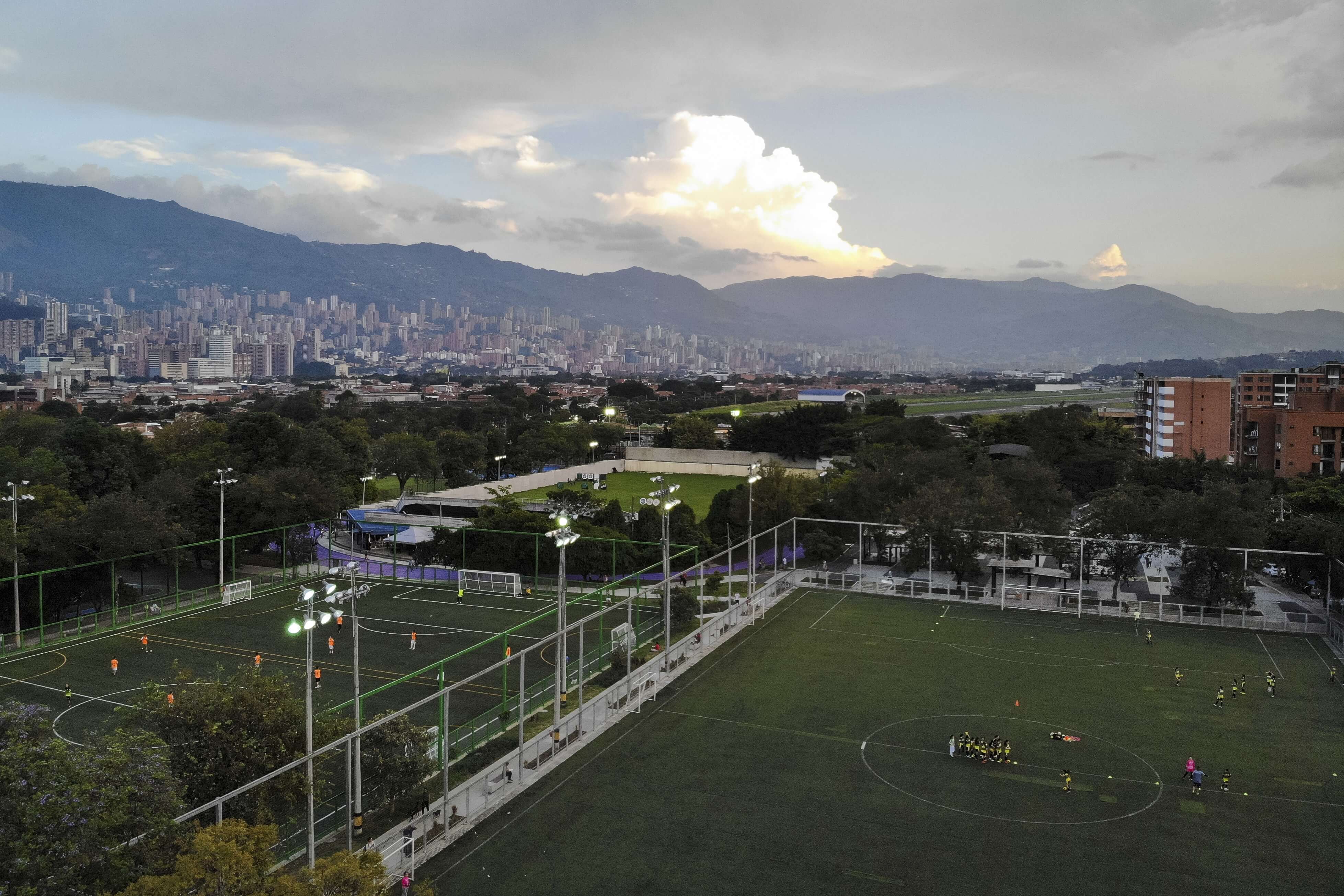
A view of the Andrés Escobar Sports Complex from the air, where Vinotinto Fútbol Club practices.
He could never do that in Venezuela.
In 2014—the year Martínez immigrated to Colombia—things had gone from bad to worse. Not only was the economy in shambles, but so was public safety. The 37-year-old couldn’t go to the grocery store without looking over his shoulder every few minutes. He hated sitting at stoplights for fear of the motorcyclists that robbed or killed people daily.
“In that type of stress, you leave your house in the morning and you don’t know if you’re going to return,” Martínez said. In 2017, the U.S. Embassy in Caracas reported that 73 Venezuelans died violently every day. “Before we became a statistic of the dead in Venezuela, I preferred to emigrate and find a better quality of life.”
Martínez was one of the lucky ones. Having Colombian parents granted him the privilege of dual Venezuelan-Colombian citizenship, so he and his wife moved in with his grandmother in Medellín until they could support themselves. It didn’t take long because of Martínez’s natural talent for entrepreneurship. He opened a pet shop, and when he saw that it wasn’t going anywhere, he closed it and started a telecommunications company that he still runs today.
Within two years, he had his own place to live, a stable business and peace of mind. But something was missing.
“In sports, and in soccer especially, you do it with people,” Martínez said. “I realized that I was alone and didn’t have anyone to play with… and I imagined that just as I was, surely many Venezuelans thought the same thing.”
He logged onto one of the Venezuelan Facebook groups he had joined and started typing: “Starting a soccer team…”
“If you have a dream, then just go after it,” Martínez said. “In the case of being an immigrant, you have to make sure you’re stable in other ways first.”
On the streets of Venezuela, artisans set up tables on the sidewalks of crowded intersections. Each table has multicolored Venezuelan bills stacked like newspapers. The artisans shuffle the bills—worth millions—in their hands, not worrying about passersby stealing them.
Ten years ago, the money on the table—Venezuelan bolívares—would’ve made them millionaires. Today, the bills are worth so little that people make purses and sculptures with them.
“Venezuela was a huge country—we weren’t going to prepare anything,” said Martínez’s mother Lilia Martínez, who lived in Venezuela for 40 years until 2017 when she moved back to Colombia. “We never thought we’d be worse off than Cuba.”
In 2014, Venezuela’s central bank stopped releasing information, like the inflation rate and public spending, because President Nicolás Maduro’s administration didn’t want the public to know how much the economy had declined. By 2017, over 87 percent of the population lived below the poverty line.
“There are people that still support [Maduro], because if you’re not lacking anything, then you’re fine. But you don’t care about your brother that’s dying of hunger. You don’t care because you’re not lacking anything, because your refrigerator is full.”
A box of cereal in Venezuela currently costs more than the average person’s monthly salary. People can’t afford housing or toiletries.
In January, National Assembly President Juan Guaidó declared himself interim president after Maduro’s second election was deemed illegitimate. The U.S., Canada, Brazil and about 50 other countries have recognized Guaidó as president. Russia, China and Cuba still support Maduro.
Guaidó has tried to import humanitarian aid, but Maduro’s officials at the Colombian border blocked trucks full of necessities. Maduro saw the event as an attempt to overthrow his administration.
“There are people that still support [Maduro],” Lilia said. “Because if you’re not lacking anything, then you’re fine. But you don’t care about your brother that’s dying of hunger.”
Dozens of Facebook responses later, Martínez established Vinotinto Fútbol Club. Almost 70 Venezuelans and about 15 Colombians make up two teams, split by age groups.
Every week around 8 p.m., they gather at one of the sets of bleachers at the Andrés Escobar Sports Complex before practice. Men trickle in slowly, some with drawstring bags slung across their shoulders, others with homemade snacks wrapped in paper towels. Those who arrive with sneakers on lace up their cleats over knee-high soccer socks, but not before greeting one another.
“Hola, ‘mano.”
“Hey, brother.”
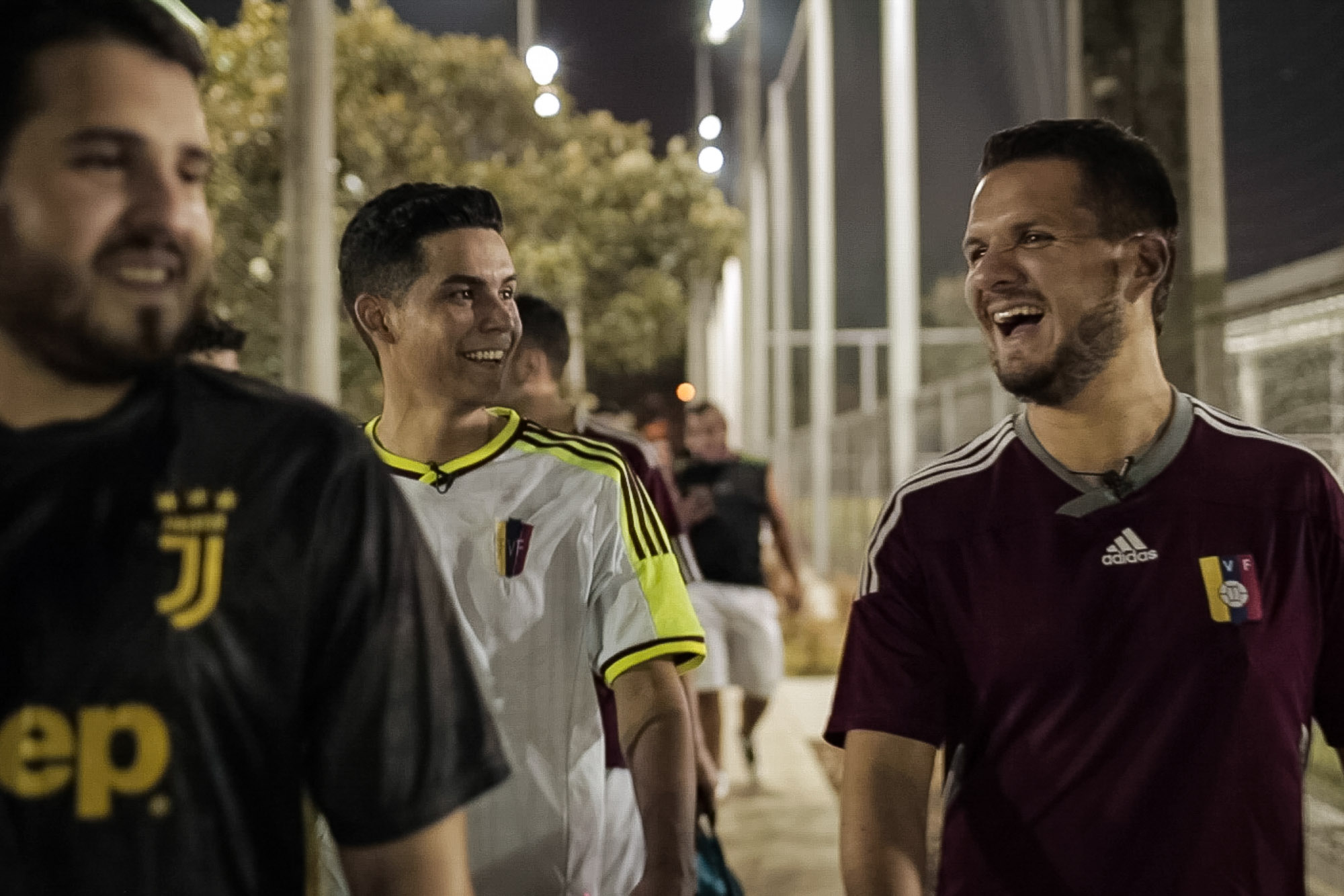
Laurenti Velasquez and Alvaro Cardenas Martínez walk to the field with the rest of the team. “The most beautiful thing is that Laurenti—and the rest of us who are immigrants—found in the team the family that we left behind,” Martinez said.
Not only do the players laugh and joke with each other, but they also support each other. Velasquez has his job at the auto shop because Martínez recommended him. Without the recommendation, he would’ve still been working at a fast food restaurant or another entry level job. He definitely wouldn’t have been at Distripartes—he’s the only Venezuelan that works there.
“I’m very grateful,” Velasquez said. “There are jobs that don’t accept Venezuelans because they believe Venezuelans come to steal, that they’re lazy. I’ve been working hard and showing what Venezuelans are really about. Because I’m happy with my job, they’re happy with me as an employee.”
“The most beautiful thing is that Laurenti—and the rest of us who are immigrants—found in the team the family that we left behind. You find people that you can speak Venezuelan with, not Spanish.”
Velasquez and the rest of Vinotinto have also faced discrimination on the field. Because they’re the only team in the league with Venezuelan players, other teams recognize them now and sometimes shout slurs.
Instead of focusing on the insults, the team concentrates on their technique, plays and communication—on and off the field.
“The most beautiful thing is that Laurenti [Velasquez]—and the rest of us who are immigrants—found in the team the family that we left behind,” Alvaro said. “You find people that you can speak Venezuelan with, not Spanish.”
